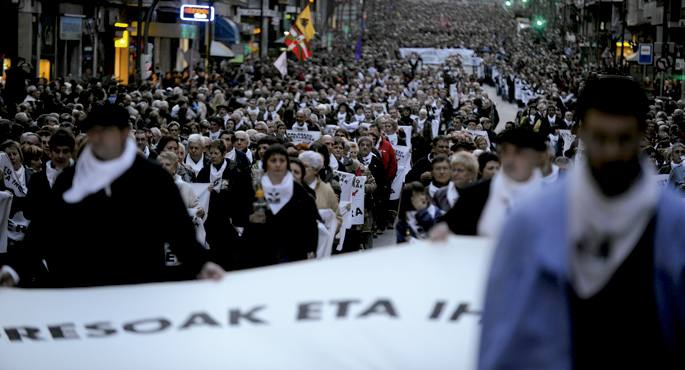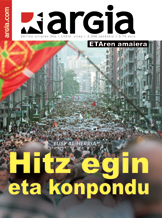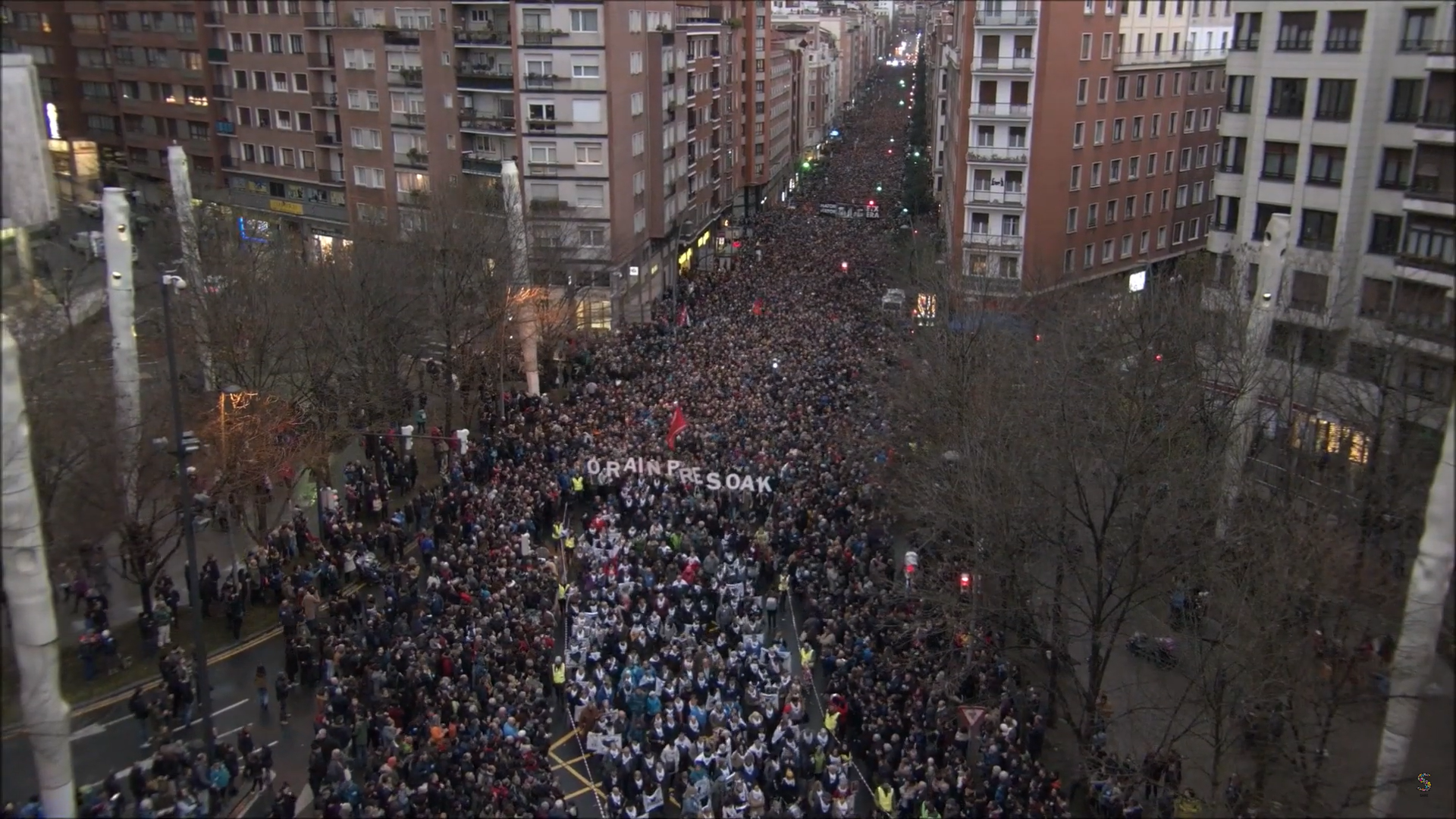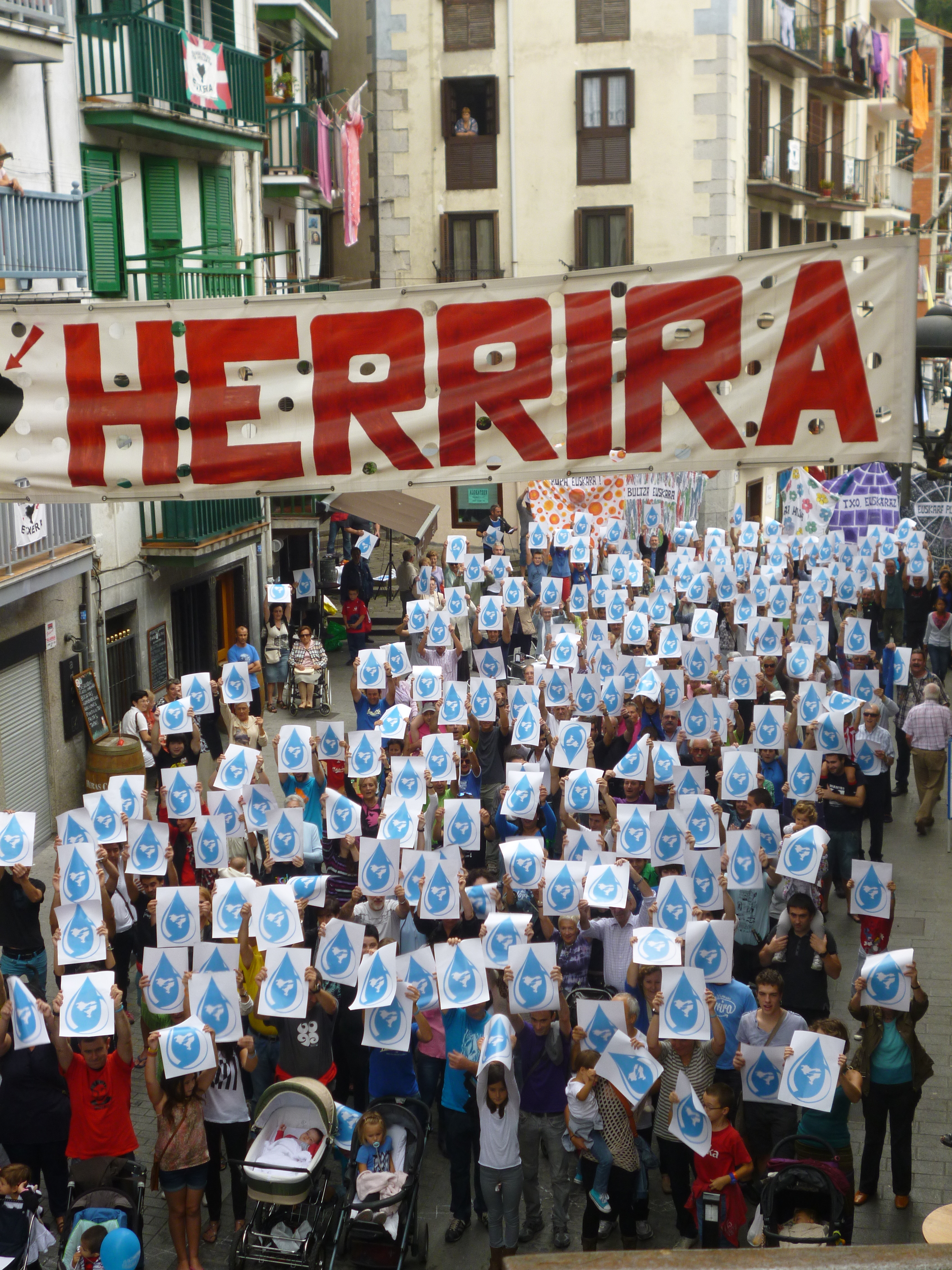Consequences of the conflict and opportunities for peace
- Will the Spanish Government start talks with ETA? This is the question that everyone is asking. As for the statements of international representatives and the central position of the PSOE and pp, it seems that yes. But in what areas can they start taking action? It is enough to review the situation of prisons and courts to realise that they have enough ground for Rubalcaba and Rajoy to come into play.

Consequences of the conflict. These are the words used in the second point of the Donostia-San Sebastián Declaration to define what ETA and the Spanish Government should dialogue. The Anoeta proposal also mentioned that second lane (demilitarization, prisoners and fugitives and victims), but on that occasion they would be the result of a negotiation prior to the delivery of weapons by ETA. On this occasion, you said, nothing has been negotiated, no concessions have been made – it has been made by Rajoy itself – ETA has left the guns and it is already there. Brian CURRIN said at the end of the Aiete conference that if the end of ETA came, he was sure that governments would respond sooner than later and that they would have to talk about security issues, gun confiscation, etc. Also significant is the involvement of Kofi Annan and Tony Blair, who in their article published in the New York Times ratifies the call for dialogue to governments and details the points to be discussed, taking as a reference the Northern Ireland talks. In the light of this international position, it seems that in this “technical aspect” Zapatero has made a number of commitments, although he cannot make them public.
What the Spanish Government could do in this area, which has tightened the screw a great deal in recent years, by adopting legally very dubious measures, is no small matter. With the implementation of the law, it would be sufficient to alleviate de facto the situation of many prisoners, for example prisoners with serious illnesses. There is still a lot of work to be done on the road to normalisation and peace; to review some of the demands made in the Gernika Agreement is enough to understand the long way to go: the end of incommunication, the review of those convicted on political issues, the repeal of the Parties Act, to take steps on the road to amnesty in the area of prisoners…
Time to get out of the mud of illegalization
After the illegalization of the Abertzale left acronyms, there has been a push from the Government. Since the outlawing of Batasuna in 2002, the State Prosecutor’s Office has repeatedly challenged the parties that have come to the elections (AuB, Citizens’ List, All Options, Socialist Abertzales, ANV, D3M…). We must remember, in full truce, the harshness shown by the prosecutor against Bildu, to the point of exhausting all avenues for it not to be presented in municipal and foreign elections. The Parties Act and the Electoral Act have also been amended several times so that the Abertzale Left does not have the slightest resemblance to being in the institutions. Although illegalisations have been endorsed by the courts, political decisions have been taken in disguise of justice.
A few weeks ago, many people were convinced that with Bildu we saw the same scenes as in municipal and foreign elections with the new coalition of sovereign forces: judicial persecution and sentences handed down in extremis. The judgment of the Bateragune case suggested that this environment existed and the attitude of Benjam-Pumpid in the case of the legalization of Sortu – “As long as ETA exists, Sortu cannot be legal,” said the chief prosecutor – recalled the times of confrontation. When Amaiur came forward, the state officials said that they would examine him carefully, while victim associations and pp quickly called for action against him. The noises of impugnations happened again. But the events of the coming weeks have radically changed the context: the adherence of the group of Basque prisoners to the Gernika Agreement, the establishment of the international verification commission, the verification of the ETA communiqué, the dissolution of Ekin, the peace conference, the request of the Abertzale left to leave the arms to ETA and the abandonment of ETA. Therefore, the illegalising speech has been completely destroyed and, if everything goes well, Amaiur will have no problem in running for the elections. The Abertzale left, therefore, has already pulled a leg out of an illegal mud.
The fact that sortu is legal or not is currently in the hands of the Constitutional Court. If before the arguments to outlaw Sortu were hanging from a weak thread, in order to ETA that thread has already been broken. Therefore, it does not appear that the court will issue a judgment against sortu, but the new party no longer has any chance of competing for the 20-N elections.
Will ‘Parot doctrine’?
ETA has abandoned weapons for good, but many believe that their disappearance will not take place without resolving some of the issues, including alleviating the living conditions of political prisoners. The Spanish and French governments have used prison policy to exert pressure. The family members of the prisoners also report that there has been an increase in the pressure exerted in recent years. An example of this is the Parot doctrine. In 2006, the Supreme Court dismissed an appeal lodged by the prisoner Henri Parot and gave effect to a new way of computing criminal redress. Until then, they were applied to the 30 years that could legally be in prison, but were subsequently applied to each sentence, although the prisoners were sentenced to hundreds of years in prison. Prisoners tried under the Penal Code of 1973 can therefore remain in prison for up to 30 years if they are sentenced to very severe penalties.
At the moment, dozens of people should be on the streets, but in application of that doctrine they remain in jail. Many of them have been appealed to the Constitutional Court and are pending trial. In May 2011, El País published a news article stating that the TC was deciding to annul the Parot doctrine and did not apply it to Spain. However, the court denied this possibility and assured that each case would be examined individually. The first 14 appeals had to be examined in July, but the case was eventually delayed until September, so no response has yet been given. On the other hand, the Public Prosecutor ' s Office has recently opposed this doctrine in the case of Joseba Artola ' s appeal for amparo. The constitutional movements and the change of approach of the prosecutor’s office have placed the compass in the direction of annulment.
The dispersal, the political decision of the Government
Currently, there are 703 Basque political prisoners, of whom only 35 are in Euskal Herria prisons, including the 20 Nanclares prisoners outside the EPPK. It has been reported time and again that dispersion punishes not only the prisoners, but also their relatives. On average, family and friends have to travel more than 1,200 kilometres per week, with the consequences that this entails (accidents, expenses, health problems…). Following the failure of the negotiations in Algiers, the Government of Felipe González began the dispersion with the clear aim of provoking dissent among the prisoners. However, after a few years, it became clear that this measure had no effect and that the ultimate goal was "to end the prisoner himself", according to his relatives. For this reason, the rapprochement of the prisoners to Euskal Herria has been one of the main demands of their families and of a large section of Basque society.
Dispersion is not based on any law, it is an arbitrary political decision of the Government and, in this regard, it has used it over and over again as a political weapon. For example, in the years following Algiers' frustration, the government took the prisoners very seriously by dispersing, while in the days of the Lizarra-Garazi Aznar truce it made some weak gestures by bringing some prisoners closer to Euskal Herria.
Although this is a decision that could be taken from one day to the next, it does not appear that the rapprochement of prisoners will take place immediately. Just as it has become an essential demand for family members, it is also a historical and symbolic claim, and both the victims and the more conservative sectors of the PP would see as a “concession” a massive rapprochement – “I will always be against the rapprochement of the prisoners” said Mari Mar Blanco, sister of Miguel Ángel Blanco and senator of the PP –. Therefore, the logical thing is that the approximation is produced in half and little by little.
Criminal codes and grades
In 1995 with the new Penal Code and in 2003 with the review, special measures were taken to tighten the penalties and conditions of ETA prisoners. Thus, the maximum prison went from 30 to 40 years of age and restrictions disappeared by means of redress. In addition, in order to achieve parole, those convicted of the crime of terrorism must be in jail longer – three-quarters of the sentence – than the other prisoners and condemn violence to go out into the street and apologise to their victims. Consideration should be given to the legal status of these conditions with the end of ETA. On the other hand, there are currently 337 prisoners in the Spanish State in the first grade, almost all day locked in cells. If the peace process that has been put in place means the normalisation of the living conditions of prisoners and the elimination of conflicts within the prison, many of them will have the opportunity to move to second grade and benefit from many benefits (more hours outside prison, permits to leave prison…).
Fugitives, papers and guarantees
There are hundreds of refugees and exiles living outside the Basque Country: In Cuba, Venezuela, Mexico, Urugain, Belgium… Many of them left decades ago and their crime would be prescribed; others have no cause against them. In the new context they will have an easier return to Euskal Herria, but to do so they need the Government’s guarantee and in some cases the “papers” to return home, as the Anai Artea association has recently explained.
Price of forgiveness, victims and reconciliation
Undoubtedly, the words of repentance and forgiveness will be heard time and again in the long process of resolving the “consequences of the conflict”. Victim associations are clear that prisoners have to show their regret and forgiveness to start taking action in their favour, according to the law, too. But the request for forgiveness should not be demanded from the point of view of the “defeated and victorious” discourse, but because the attitude towards reconciliation is fundamental. Baketik’s director, Jonan Fernández, stated in his article published in Larrun that forgiveness should be voluntary, that it is not a necessary condition for starting a process of reconciliation, but a determining one.
The victims are the most painful consequence of this conflict that we have experienced, both on the one hand and on the other. The Donostia-San Sebastian Declaration calls for recognition because “the strength of reconciliation is based on the primacy of hate based customs,” the statement states. n
Atzera pausoa kartzeletan... [+]
“Bakea Euskal Herrian, orain presoak” lemapean, 11.000 lagun batu dira Parisen arratsalde honetan. Euskal Herriko xoko guztietarik hurbildu da jendea eta guztien artean bete dute 10.000 manifestari biltzeko helburua. Alderdi eta kargu ezberdinetako hautetsiak ere... [+]
Zer adierazi nahi dugu lerroburu horretan? Bada, beharrezko dutela aurrean duten euskaldunek funtsezko gaiei planto ez egitea. Hau da, Euskal Herria praktikan herrialde okupatu gisa onartzea, okupatzaileei aurre egin gabe.
Oso ausarta da EPPKren erabakia. Lehenbiziz bere bizitzan, badaki aurrerantzean bera izango dela bere buruaren guztiz jabe, ez duela ETArekin partekatu beharko ezer, molde batez edo bestez ETA desagertzera doalako eta presoek arduratu beharko dutelako beren etorkizunaz, beti ere... [+]
Alderdiek, kolektiboek edo espetxean nahiz “kanpoan” dauden militanteek hartutako jarrera politikoen aurrean dugun iritzia edozein dela ere, ideia, kokatze eta dinamika politikoei buruzko eztabaida, gure ustetan, gutxieneko irizpide batzuei loturik egon beharra dago.
Hori da astelehen honetan Deia egunkariak argitaratu duena eta, honen arabera, erakunde armatuak urte bukaerarako eman dezake desagerpenaren berri.























